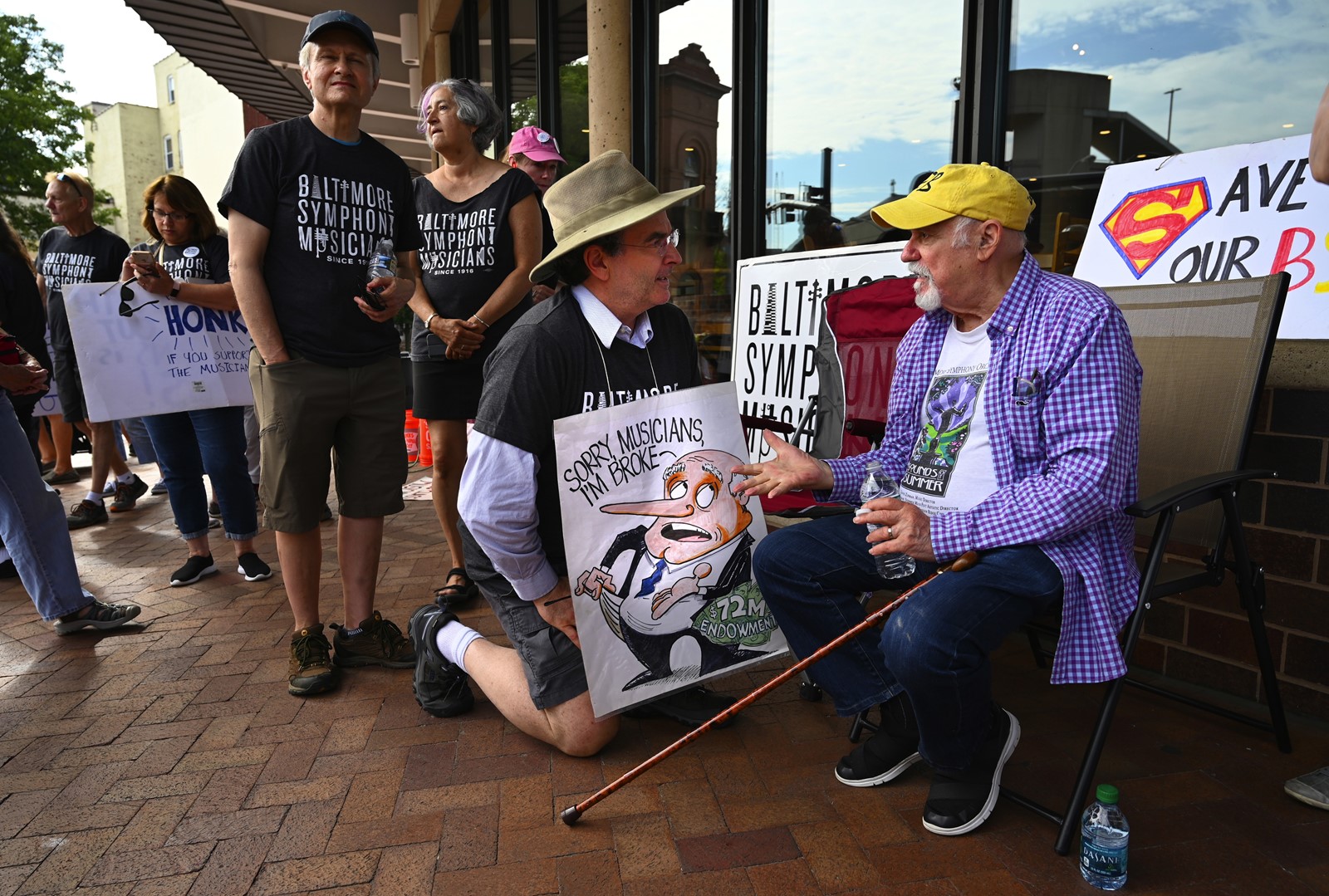‘Shocked, mortified and horrified’
Noted former BSO music director David Zinman joins picket line

David Zinman, the former music director of the Baltimore Symphony Orchestra and a pivotal figure in the arts group’s history, visited the players’ picket line Monday to express his outrage at the efforts to shorten the orchestra’s season.
“I was shocked, mortified and horrified to hear what was happening,” said Zinman, the orchestra’s conductor from 1985 to 1998. He was wearing an old T-shirt that read, “Baltimore Symphony Orchestra: The Sounds of Summer.”
Though the warm month concerts began long before Zinman arrived in Baltimore, strengthening the summer season was a hallmark of his tenure.
“It would be like telling the Baltimore Orioles, ‘Take 40 games away from your season. You’ll be a minor league team, but it doesn’t matter,’” he said.
“This is a major league orchestra and it’s meant to stay that way. A long time ago, I spent 10 years blowing up a balloon. And now the balloon has been popped and everything is falling out.”
Zinman placed his hand over his heart and added, “it pains me to see this.”
He was reacting to a rancorous labor dispute that has erupted between the Symphony’s management and its 76 musicians, who Monday began their second week of being locked out of Meyerhoff Symphony Hall. The musicians had worked for four months without a contract, which expired in January.
“We have great admiration and deep respect for our former Music Director David Zinman,” Peter Kjome, the symphony’s President and CEO said in an emailed statement. “We appreciate his concerns over our current situation, but unfortunately those concerns do not change the facts about our financial circumstances.”
The organization announced in late May that it was canceling its summer season for financial reasons. Citing deficits that have totaled $16 million in the past decade, symphony management has proposed a new contract that would include a roughly 20% pay cut for musicians but retain health insurance and other benefits year-round. The changes would have minimal impact on audiences, the organization has said, because the reductions would occur during the summer when traditionally few concerts are performed.
The musicians have proposed a “status quo” contract, according to Greg Mulligan, co-chair of the Players Committee, that would continue the 52-week season that has been in place since 1984. In addition, the musicians are seeking a cost of living raise and to increase the total number of musicians to 83, the level that Mulligan said was specified in the most recent contract.
Zinman, now 82, lives in New Jersey with his wife, Mary, who formerly played viola for the BSO. The couple stopped off at Meyerhoff Symphony Hall on their way home after a trip to Virginia.
“It’s unbelievable that this could be happening to an orchestra of this caliber,” she said. “It’s just ridiculous.”
Their arrival shortly after 9:30 a.m. was an emotional moment for the musicians. Of the roughly 100 people on the picket line, more than two dozen had formerly played for Zinman. Some cried.
It was under Zinman, Mulligan said, that the orchestra achieved an international reputation. In 1987, the BSO became the first orchestra to tour the former Soviet Union in almost 12 years.
Zinman also launched an ambitious series of recordings, for which the BSO won its first Grammy Award in 1990. The award-winning series featured a recording on Sony Classical of the orchestra performing Benjamin Britten’s Cello Symphony and Samuel Barber’s Cello Concerto with the superstar cellist Yo-Yo Ma, an old friend of Zinman’s.
“That’s the man who hired me when I was 21 years old,” said Ivan Stefanovic, the associate principal violinist who walked the picket line Monday with the youngest of his three sons.
“I began working for the BSO on Jan. 2, 1991. Six months later, civil war broke out in Yugoslavia. I had been told that I was destined for the Yugoslavian special forces. I don’t know if David Zinman saved my life. But, he definitely saved me from fighting in a civil war.”


